 |
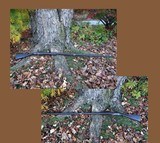 |
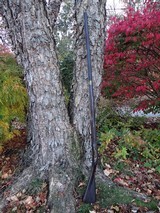 |
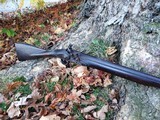 |
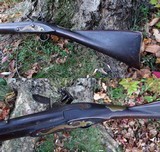 |
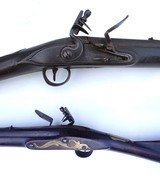 |
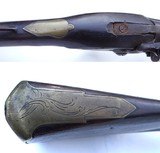 |
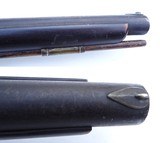 |
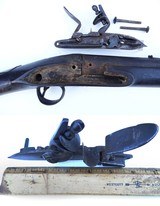 |
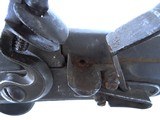 |
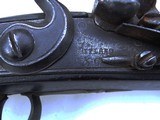 |
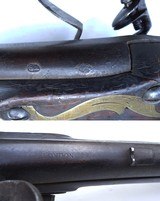 |
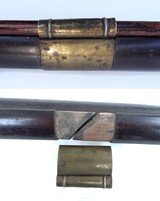 |
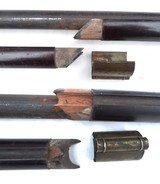 |
 |

Exceptional Colonial American Period Flintlock Ketland & Co.Trade Gun
Guns International #: 101377622 Seller's Inventory #:
Category: Antique Rifles - Flintlock - Antiques
Seller's Information
When emailing or calling sellers direct, please mention that you saw their listing on GunsInternational.com
Seller: A & A Gaines Antiques
Member Since: 11/2/08
State: Rhode Island
Zip: 02840
Country: United States
Phone: (401) 846-0538
Number of Active Listings: 0
Total Number of Listings: 66
Seller: Private Seller
Return Policy: 3 day inspection and return policy on used guns.
3 days
Payment Types Accepted: USPS Postal Money Order or Bank Check
Description:
An exceptional original flintlock 48" barrel Ketland & Company Trade Gun, circa 1760. The gunmaking company of William Ketland was established in Birmingham, England in the 1745-1750 period and developed a substiantial business producing firearms for export to North America. One of their most successful arms was what has come to be known as the, 'Ketland Trade Gun'. The English needed a special long gun designed to compete with French Indian trade guns in their military and trading confrontations with the French over control of North America ( this military and commercial strife lasted from the 17th century into the latter decades of the 18th century involving all who lived in the region).
These very handsome and well built Ketland guns were relatively light weight long barrel full stock flintlock brass mounted smoothbore pieces of .62 caliber (roughly 20 guage) with fairly thick walled barrels intended for firing a single ball and/or shot. Those intended primarily for shooting a single ball had rear sights in addition to a rather distinctive silver front sight. Ketland long guns of this type have excellent handling characteristics. They are of a very practical caliber for both hunting and defense. Their sleek form attracted a lot of attention. These guns became so popular as hunting, militia, and trade arms in the American Colonies with both Indians and white colonists that they continued, with minor improvements, being built from around 1750 into the 1830s.
Today, examples of the flintlock 'Ketland Trade Gun' in fine original condition are quite difficult to find. They were utility guns intended for hard use in rough country on the edges of 'civilization' and they simply got worn out and used up. Remains of these guns have been found in excavations of Indian camps and white forts/settlements up and down the US East Coast and westward across the Allegheny Mountains.
The 'Ketland Trade Gun' shown here is one of the truly rare early - circa 1760 - period examples. The first Ketland guns of this type may have been built as early as 1750 and appear to have had three screw locks, see P-282, "Firearms In Colonial America", by M.L Brown. Another early three screw Ketland flintlock is pictured on p-74 of, "COLONIAL FRONTIER GUNS", by T.M.Hamilton. The lock on the gun featured in overall and detail pictures here is of the same long tailed pattern but is fitted for two screws (side nails) see P-112 of the previously mentioned book and likely represents the next step in Ketland's design (circa 1760).
The 48" barrel of this gun is full round with a 4" top flat ending behind the rear sight and engraved, 'London'. The barrel shows two proofmarks at the breech, one of which is unclear with the other being a crown over 'P' mark, which may be an early Ketland private proof.
The brass furniture is Ketland's design including his scrolling/semi-dragon sideplate. The original Brown Bess style large escutcheon plate atop the wrist is somewhat unusual.
The most unusual completely original feature of this Ketland is that it was built with a two-piece walnut stock featuring a very well designed brass sleeve cover with integral ram rod thimble covering and reinforcing the joint. Pictures below show details of construction and that the conventional under-the-barrel lug for attaching a ram rod thimble was never present. The brass sleeve is a fairly complex piece and would have raised the overall cost of production and subsequent price of this gun which makes one wonder why the gun was built this way. The most logical reason is that shipping crates of five foot long guns would not have been easy. A crate of five guns or more would have been difficult to manouver down the hatches and safely stow aboard merchant ships of the period. Five foot long crates would also have been inconvenient for frontier wagon transport not to mention packing them on horses or mules for a possible journey of several hundred miles on the available trails of the period. Guns which could be taken down would fit in more convenient crates, be much easier to transport, and have a better chance of arriving at frontier trading forts in good condition. I am told there are HBC records indicating the recipients of these trade guns did not like the two piece stocks. Evidently few were produced since this is the only example we have seen.
CONDITION: This early 'Ketland Trade Gun' is in excellent original 'untouched' condition. The barrel has a deep un-cleaned black/brown patina with proper pitting around the touch hole. The original flintlock is in the same condition with some high edge brightness and a slightly cleaned patch within which is the 'Ketland' mark. The lock is in excellent condition, works well, and the springs have good tension. The interior of the pan is pitted from use and the face of the frizzen shows appropriate wear. The brass furniture is in excellent condition, all engraving is clear and crisp with excellent unpolished patina. The walnut stock is in excellent original condition with original finish/surface and great patina. The wooden ramrod shows similar patina and has a metal fitting at the bottom end.
This rare and exceptional French & Indian War / Pre-Revolutiopnary War gun shows genuine use yet has somehow survived in miraculous ' in-the-black' original condition. This early 'Ketland Trade Gun' would be rated a best-of-its-type example in any private or public collection. This gun has been in a private collection for the last forty years.
Dimensions: overall length 63", barrel length 48", caliber .62 (aprox 20 bore).
SOLD
Antique: Yes
Manufacturer: Ketland & Co.
Caliber Info: .62
Condition: excellent original
Metal Condition: excellent original
Wood Condition: excellent
Gauge Info: 20
Stock: walnut full stock
Finish: excellent original
Manufacture Date: circa 1760